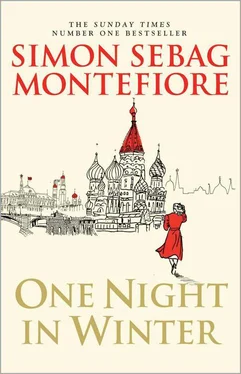Rosa said, ‘Who dies tonight? Let’s play…’ Then she recited:
‘The gleaming pistols wake from drowsing.
Against the ramrods mallets pound.
The balls go in each bevelled housing.’
She offered the case to Nikolasha who chose one pistol, and then she handed it to Vlad who took the other.
‘Are you happy with your weapon, Mr Lensky?’ Rosa asked Vlad. He nodded. She turned to Nikolasha. ‘And you, Mr Onegin?’
‘Are the pistols charged and ready to shoot?’ he asked.
She nodded formally.
Vlad and Nikolasha held their pistols upright like crucifixes in church and proceeded ritualistically out into the graveyard where a twenty-yard path was marked out by candles.
‘ The duellists shed their cloaks and wait, ’ said Nikolasha. He and Vlad shed their frock coats, George marked out thirty paces, and the boys stood facing each other. Their ruffled white blouses glowed in the moonflooded twilight, and the oiled steel of the pistols glimmered.
Rosa’s voice rang out: ‘ “Approach at will . ” ’ The boys walked towards each other.
‘ Four fateful steps… Five paces more .’
Nikolasha lowered his pistol slowly and, closing one eye, he aimed the barrel at Vlad’s chest, saying as he did so:
‘Onegin then, while still not ceasing
His slow advance, was first to raise
His pistol with a level gaze.’
Vlad raised his pistol too and took aim. But Nikolasha, playing Onegin, was ahead of him: he started to squeeze the trigger.
Andrei found it hard to breathe. It was all very silly, this ritual of amateur dramatics, yet there was something enthralling about it. The black thuja trees, the candles casting long shadows over the graves, the swirling teenage emotions and the macabre drama of fatal duels touched him. They were play-acting, but every Russian had lived Pushkin’s duels, the passion plays of the Russian soul.
The trigger clicked, and there was a deafening crack and an orange flash. Vlad held his chest, tottering. Red blood soaked his white shirt. He fell.
Nikolasha, narrating every movement with the correct words from Pushkin, ran to Vlad, knelt beside him, called his name and then, standing over his ‘body’, the Fatal Romantics recited together:
‘The storm has blown; the lovely flower
Has withered with the rising sun.
The altar fire is out and done!’
The Game was over, and Andrei could breathe once more. Half an hour later, as Rosa was collecting the glasses, she tripped and knocked one off the tomb.
‘I’m so sorry,’ she whispered, picking up the shattered glass from the ground.
‘You’re so clumsy, you spoil everything,’ Nikolasha snapped in a spasm of cruelty that made Andrei wince for her. ‘You just don’t have the sensory talents for passion. But Serafima has it in spades. Serafima understands poetry. Without her, the Fatal Romantics wouldn’t exist. Don’t you agree, Rosa?’
Rosa’s pale face flushed. ‘At least I’m here this evening,’ she said. ‘Serafima’s not. Where is she, Nikolasha?’
‘She said she might come later,’ he said.
‘Well, I hate to tell you, but I don’t think she’s coming.’ Rosa turned to Andrei. ‘But that makes no difference. Even when she doesn’t deign to join us, she’s always here.’
And that was when Andrei realized why Nikolasha was so peevish. Serafima hadn’t come and Rosa’s devoted presence reminded him of her absence. Andrei understood how he felt. Ever since he’d arrived at the school, he had wanted to join the Fatal Romantics’ Club. Now he was in – but without Serafima, he didn’t give a kopeck whether his name appeared in the Velvet Book of Love or not.
A COLUMN OF mechanical khaki dinosaurs, T-34 and heavy KV tanks, rumbled down Gorky Street the next morning as Andrei walked to school. One lurched to a halt, shook and broke down, spluttering black diesel smoke. Phalanxes of soldiers drilled on Red Square, horses clattered on the cobbles, and the roar of the machinery and bark of drill sergeants sounded louder, more urgent: a symphony of rising excitement. It was five days until the Victory Parade, and Moscow had become a stage with a vast cast of foreigners arriving each day: Chinese, Americans, even Fijians and Africans, filled the hotels. Women were on the streets too – peasants offering fruit and flowers and sometimes a knee-trembler in an alleyway. The roads were crammed with trucks and self-propelled guns; and one could not move at the Belorussian Station for soldiers in army green and navy blue, all arriving to march past Stalin.
At assembly in School 801, Director Medvedeva announced the Pioneers who would go on a special camping trip.
‘I hate camping,’ whispered Senka Dorov, who was sitting next to Andrei. ‘It’s cold and uncomfortable and the food’s horrid. Why’s everyone in the Soviet Union so obsessed with camping?’
But Andrei was looking for his fellow Fatal Romantics. There they were – all together a few benches away: Minka and George, Vlad more cadaverously pale than ever, Nikolasha with Rosa Shako, her eyes as always seemingly half closed, at his side. But where was Serafima? Try as he might, Andrei couldn’t find her.
At lunch break, Andrei bumped into George and Minka, who were running down the central corridor towards the lavatories. Dr Rimm was following them.
‘Chin up, girl!’ he cried at Minka. ‘Discipline. The world’s eyes are settled on Moscow. Five days until the parade. Long live Stalin. No smirking, Andrei Kurbsky – tuck your shirt in!’
As soon as he’d passed, George pulled him into the cloakroom. ‘Have you noticed anything special about Dr Rimm?’ he whispered.
‘He’s excited about the parade,’ said Andrei.
‘No, silly, he’s quivering with love,’ added Minka.
‘You haven’t sent him another letter, have you? The more you send, the more dangerous it’ll be if he ever finds out.’
‘How can he?’ George was laughing. ‘We’ve been sending him special ones for the Victory Parade. We’re going to post this to him right now.’ He showed it to Andrei.
DEAREST PEDAGOGUE,
I DREAM OF YOU SINGING A PATRIOTIC SONG TO CELEBRATE THE VICTORY PARADE. IF YOU LOVE ME, OH BOLSHEVIK NIGHTINGALE, SING, SING LOUDLY!
YOUR ‘TATIANA’
He didn’t see Serafima until that afternoon at pick-up.
‘I hear they let you in to the Fatal Romantics’ Club.’ She’d come up behind him. Andrei jumped a little and he remembered the drive back from Vasily’s.
‘I’m sure you told them to.’
‘Why would anyone listen to me?’ She smiled as they walked through the Golden Gates.
‘Will you be playing the Game?’ he said, desperate to detain her. ‘You’d suit the costumes.’
She stopped, her head on one side in that way of hers that made him feel he had her full attention – just for a moment. ‘You mean I’m old-fashioned?’
‘I like the way you dress.’
‘You admire my Bolshevik modesty?’
‘It just makes you even more—’
‘A compliment from Andrei?’ She cut him off. ‘Don’t we have enough romantics here already?’
‘But you’ll be at the Victory Parade?’
‘I suppose so.’
‘You don’t sound very excited.’
‘My parents are excited. I’m not very interested in howitzers and tanks.’ She leaned towards him. ‘But I’m looking forward to the Game afterwards.’
‘Why’s it all so secret?’
‘Don’t you see? In our age of conspiracy, everything is conspiratorial. Even having a picnic or reading poetry.’
They’d reached the street and, with a wave, she was gone.
Читать дальше












